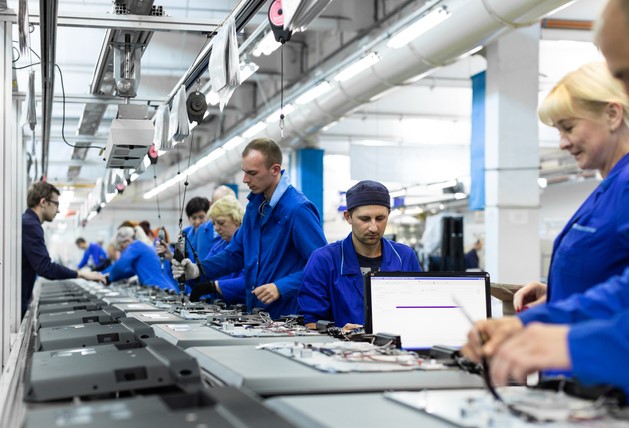In recent years, temporary labour contracts with production workers from Eastern Europe have become increasingly popular. But why is that? In this blog article, we want to take a closer look at this topic and analyse the reasons for this boom. But before we dive deeper into the subject, let's first take a look at the term "temporary workers" and the associated Temporary employment contracts to deal with this. Because only with a fundamental understanding can we understand the situation of Production workers from Eastern Europe understand better.
Why are temporary contracts with production workers from Eastern Europe booming?
You are probably wondering why more and more temporary labour contracts have been concluded with production workers from Eastern Europe in recent years. There are many reasons for this:
- Wages in Eastern Europe are often lower than in Germany, which allows companies to save costs.
- There are many well-trained skilled workers in Eastern Europe who are often hard to find in Germany.
- The flexibility of temporary employment contracts for companies is attractive, as they can react quickly to order situations and production fluctuations.
However, there is also criticism of this practice, as agency workers are often paid and treated less favourably than permanent workers. It is important to be aware that agency workers are not second-class workers and that their rights and working conditions are just as important as those of permanent workers.
How do companies benefit from temporary workers from Eastern Europe?
An analysis of the companies shows that they benefit from temporary workers from Eastern Europe, as they often have a high work ethic and flexibility. They are also often prepared to work for lower wages than German workers. This enables companies to save costs and organise their production more efficiently.
It is important that companies deal responsibly with agency workers and respect their rights and needs.

How do Eastern European workers benefit from temporary employment contracts?
If you are wondering why so many Production workers from Poland, The Czech Republic, Slovakia, Romania and Eastern Europe work in temporary employment contracts, there are different answers.
- One is that they benefit from the advantages that this type of contract offers. For example, they can work more flexibly and often have the opportunity to work in different companies and industries.
- They also often receive higher wages than in their home country and have the chance to improve their skills and knowledge.
Of course, there are also disadvantages such as: uncertainty and flack of social security. But for many Eastern European workers, the advantages outweigh the disadvantages. It is important to emphasise that each case is individual and that there are also black sheep among temporary work agencies. Nevertheless, it is interesting to see that temporary employment contracts are an attractive option for many Eastern European workers.
What impact does the deployment of personnel from Eastern Europe have on the labour market and the economy in Germany?
You may be wondering why labour leasing contracts with production workers from Eastern Europe are so popular. The effects on the labour market and the economy in Germany play an important role here. By hiring temporary workers from Eastern Europe, companies can save costsas they often receive lower wages than German employees. This allows companies to Act more competitively and offer their products at lower prices.
However, it also leads to a displacement effect on the German labour market, as local workers can be replaced by foreign workers. In addition, the increased use of temporary workers can lead to a deterioration in working conditions, as they often have fewer rights and protection than permanent employees. Overall, the use of temporary workers from Eastern Europe is a controversial topic that has both positive and negative effects on the labour market and the economy in Germany.
What are the opportunities and risks for temporary workers from Eastern Europe?
When you work as a temporary worker from Eastern Europe in Germany, there are both opportunities and risks. On the one hand, you have the opportunity to expand your skills and experience and increase your income. On the other hand, it can be difficult to find your feet in a foreign country and working conditions can be worse than expected. It is important to find out about your rights and obligations as an agency worker to protect yourself from exploitation. You should also make sure that you are paid fairly and that your working conditions are safe. There are also organisations that support temporary workers and can help you to assert your rights. It is important that you do not feel left alone and that you know that support is available.
Find temporary workers for production:
Are you looking for temporary workers for production? We from Zeitarbeit International are your experienced personnel service provider when it comes to the placement of production workers from Eastern Europe. We are looking for motivated and committed German-speaking production assistants, production workers and production employees. Due to the shortage of skilled labour in Germany, more and more factories and companies are using production assistant recruitment, where workers are recruited from Eastern Europe. We offer companies recruitment services for production & manufacturing such as bottlers, production workers, assembly line workers, order pickers, inspectors, packing assistants, production assistants and production managers. For work on the assembly line, production facilities, quality control, packing, sorting, scanning through to general unskilled labour:
- Assembly/electrical installation
- Cleaning
- Sorting
- quality assurance
- Storage work
- Mounting
- Packaging
- Securing components with screws
- Assembling products
- Drilling holes
- Carrying out error checks
- Clean-up
- Making adjustments to equipment
- Transport
- Filling beverages
- Producing medicinal products
- Production of cosmetics and fertilisers
- Producing plastic granulates
- Monitoring machines
